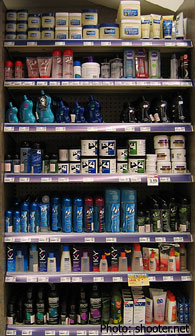A study by the Population Council (Begay 2011) has found that every one of a panel of 41 commercially-available sexual lubricants for sale in the USA damaged human rectal and colonic cells in the test tube and compromised the integrity of the single-cell layer that forms the surface of the rectum.

In contrast Carraguard, a gel formerly tried as an experimental microbicide, did not damage cells.
Unexpectedly, the investigators found that four of the lubricants not only damaged the rectal lining cells but appeared actively to increase HIV replication in the cell cultures.
They found that this activity was caused by polyquaternium-15, a commonly-used cosmetic ingredient, which has the property of facilitating HIV’s attachment to cells.
The study, whose original findings were presented at the Microbicides 2010 Conference last year (Begay 2010), complements the results of two other studies presented at that conference. The first (Russo) tested six popular lubricants and found that four stripped cells off the rectal epithelium (surface membrane). The second (Gorbach) found that men and women who took part in a rectal microbicide study and who used lubricants for anal sex were three times more likely to be diagnosed with gonorrhoea, chlamydia or syphilis than people who used no lube.
For the current survey Othell Begay and colleagues from the Population Council tested a panel of 41 commonly-used lubricants. They tested their cytotoxic (cell-killing) activity in two different ways and, by culturing them with HIV-infected cells, tested whether they inhibited or enhanced viral replication. They used the ratio of their cytotoxic and antiviral properties to calculate a “therapeutic index” (TI) which predicted whether they might have any useful HIV-inhibiting potential in real-life situations.
The researchers compared results from the 41 commercially-available lubes with Carraguard, as detailed above, and also with medical saline solution and Gynol II, a spermicide cream already known to be cytotoxic, as it contains nonoxynol-9, a compound which has been known for ten years to damage cells and make users more vulnerable to HIV.
They found that cells treated with all the lubricants were damaged. A cell assay called TEER (transepithelial electrical resistance) gauges cell integrity by testing their resistance to electric current – whole cells transmit electricity less easily. The researchers found that the TEER value for cells exposed to the lubricants had dropped by 60% within two hours, as it did for cells exposed to Gynol II, whereas it remained steady for cells exposed to Carraguard and saline.
The researchers found only one lubricant with mild anti-HIV activity – the vaginal moisturiser Replens. However the therapeutic index for Replens was under 100 compared with a TI of over 3500 for Carraguard – and Carraguard failed when tested as an HIV-preventing microbicide.
Unexpectedly, the researchers found that one brand of lubricant – Astroglide – appeared actively to enhance HIV replication in cells.
Astroglide has previously been found to inhibit HIV in the test tube to some extent, not enhance it. This paradox can be explained by the fact that, like nonoxynol-9, some lubricant ingredients destroy viruses by dissolving their containing membrane – but do the same thing to cell membranes, and thus have a net harmful effect.
The four (out of six) Astroglide lubricants that appeared to increase viral replication were the only ones containing a compound called polyquaternium-15 which, when tested, was found to be the cause.
In the Russo paper presented last year it was theorised that the cytotoxic properties of lubricants might be due to their being hyperosmolar. This means they contain more sugars and salts than the body’s natural fluids. When hyperosmolar fluids come into contact with cells they cause cells to secrete water and dry up.
Most of the lubricants tests in this study were hyperosmolar. However four where hypo-osmolar, meaning they contained less sugar and salt than body fluids, and one was iso-osmolar, meaning it contained the same balance as body fluids, and none of these were any less toxic. Replens, the least toxic lubricant, was also the most acid, and it is known that vaginal acidity help to protect against HIV transmission.
What does this mean for users of lubricants? These are still preliminary results and much more research is needed before detailed recommendations can be made.
It is important to emphasise that the lubricants tested were all water-based. Water-based ‘lubes’ were initially recommended for use in safer sex because they do not weaken condoms whereas oil-based ones cause them to burst. Since it is the condom that is protecting users from HIV rather than the lube, condom users should still be encouraged to use water-based lubes because condoms are also more likely to break, and trauma to the rectal lining occur, with no lube.
However for people who for one reason or another do not use condoms, water-based lubes may not the safest ones to use. A good compromise are the silicone-based lubricants, which do not appear to damage cells and are also safe with condoms.













